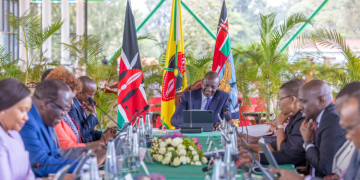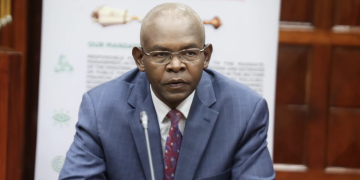Select Kenyan businesses are at risk of collapsing or shutting down, according to the Controller of Budget, Dr. Margaret Nyakango.
While presenting the Budget Implementation Review Report for the Financial Year 2024/2025 before the Budget and Appropriations Committee on Wednesday September 3, 2025, chaired by Alego Usonga Member of Parliament, Samuel Atandi, Dr. Nyakang’o warned that the growing pile of pending bills owed by State Corporations and various Ministries, Departments, and Agencies (MDAs) is choking cash flow in the economy and putting Small and Medium Enterprises (SMEs) in danger of shutting down.
Controller of Budget Warns Collapse of SMEs
She outlined the negative effects of these unpaid bills, which include liquidity challenges, possible business closures, job losses, and increased government expenditure due to penalties and interest charges, as well as a loss of trust from the private sector.
“As of 30 June 2025, pending bills for the National Government stood at Ksh 524.84 billion, up from Ksh 516.27 billion the previous year.
Of this amount, Ksh 404.33 billion (77%) was owed by State Corporations, primarily for contractor payments, supplier arrears, statutory deductions, and pension obligations, while Kshs. 120.51 billion (23%) was owed by MDAs, mostly related to historical bills under recurrent and development expenditures,” said Nyakang’o.
Also Read: Equity Fund and African Guarantee Pumps Ksh64 Billion to Finance MSMEs
The Controller of Budget stressed the need for urgent action to avert that outcome, recommending that the National Treasury expedite the verification and settlement of eligible pending bills to alleviate pressure on the private sector and restore confidence in government payment systems.
Nyakang’o Issues Way Forward to Avoid the Outcome
Additionally, Nyakang’o urged the adoption of sound planning and expenditure management practices to ensure that essential services are prioritized and adequately funded throughout the formulation and execution of the national budget.
This approach, she noted, would reduce the overreliance on Article 223 of the Constitution, which allows the Cabinet Secretary for the National Treasury to authorize withdrawals to support ongoing programs without prior approval.
“In the fiscal year 2024/25, a total of Ksh 83.96 billion in withdrawals were authorized by the National Treasury’s Cabinet Secretary, of which I authorized Kshs. 66.54 billion,” Dr. Nyakang’o observed.
Also Read: Kenya Takes Action After Tanzania Bans Foreigners from Select Businesses
She pointed out that these actions violate Paragraph 40(4) of the Public Finance Management (PFM) Regulations 2015, highlighting existing weaknesses in budget planning and execution.
Follow our WhatsApp Channel and X Account for real-time news updates.






![President Ruto Address During Mashujaa Day And How He Honored Raila [Full Text Speech] President Ruto Address During Mashujaa Day And How He Honored Raila [Full Text Speech]](https://thekenyatimescdn-ese7d3e7ghdnbfa9.z01.azurefd.net/prodimages/uploads/2025/10/ruto-mashujaa-address-360x180.jpg)







































































